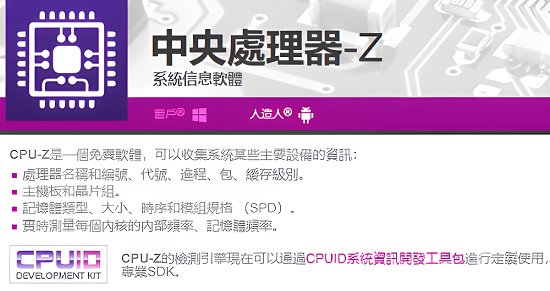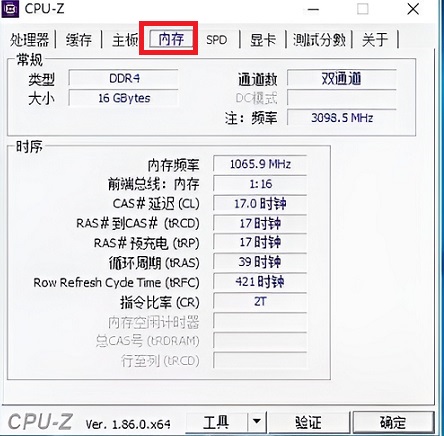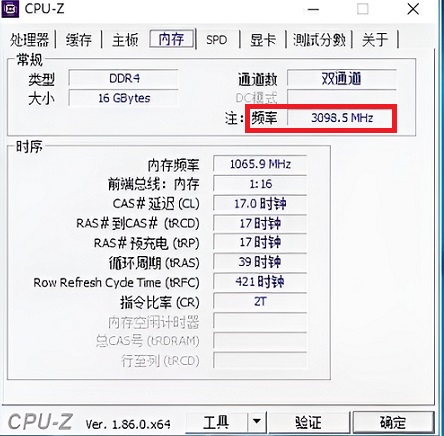How to check the frequency of ddr4
The biggest impact of ddr4 memory sticks on computers is frequency, and many users don’t know how to check the frequency. In fact, you can check it through the CPU software, and all aspects of information are displayed in great detail.
How to check the frequency of ddr4:
1. You must first check it through the software. You can use CPU-z to check it.

2. After it is done, open it and click "Memory".

3. At this time, you can see the "frequency" below.

The above is the detailed content of How to check the frequency of ddr4. For more information, please follow other related articles on the PHP Chinese website!

Hot AI Tools

Undresser.AI Undress
AI-powered app for creating realistic nude photos

AI Clothes Remover
Online AI tool for removing clothes from photos.

Undress AI Tool
Undress images for free

Clothoff.io
AI clothes remover

AI Hentai Generator
Generate AI Hentai for free.

Hot Article

Hot Tools

Notepad++7.3.1
Easy-to-use and free code editor

SublimeText3 Chinese version
Chinese version, very easy to use

Zend Studio 13.0.1
Powerful PHP integrated development environment

Dreamweaver CS6
Visual web development tools

SublimeText3 Mac version
God-level code editing software (SublimeText3)

Hot Topics
 1377
1377
 52
52
 Which has a greater impact on performance, memory frequency or timing?
Feb 19, 2024 am 08:58 AM
Which has a greater impact on performance, memory frequency or timing?
Feb 19, 2024 am 08:58 AM
Memory is one of the most important components in the computer, and it has a significant impact on the performance and stability of the computer. When choosing memory, people tend to focus on two important parameters, namely timing and frequency. So, for memory performance, which is more important, timing or frequency? First, let's understand the concepts of timing and frequency. Timing refers to the time interval required for a memory chip to receive and process data. It is usually represented by a CL value (CASLatency). The smaller the CL value, the faster the memory processing speed. The frequency is within
 ASUS TUF Z790 Plus is compatible with ASUS MCP79 memory frequency
Jan 03, 2024 pm 04:18 PM
ASUS TUF Z790 Plus is compatible with ASUS MCP79 memory frequency
Jan 03, 2024 pm 04:18 PM
ASUS tufz790plus supports memory frequency. ASUS TUFZ790-PLUS motherboard is a high-performance motherboard that supports dual-channel DDR4 memory and supports up to 64GB of memory. Its memory frequency is very powerful, up to 4800MHz. Specific supported memory frequencies include 2133MHz, 2400MHz, 2666MHz, 2800MHz, 3000MHz, 3200MHz, 3600MHz, 3733MHz, 3866MHz, 4000MHz, 4133MHz, 4266MHz, 4400MHz, 4533MHz, 4600MHz, 4733MHz and 4800MHz. Whether it is daily use or high performance needs
 The 5 Best Windows 11 Mini PCs You Can Buy Today
May 01, 2023 am 08:07 AM
The 5 Best Windows 11 Mini PCs You Can Buy Today
May 01, 2023 am 08:07 AM
The advent of personal computing was accompanied by a significant reduction in the size of computers. Companies and institutions had the first computers and they occupied a huge footprint. As technology advances, it enables components previously dedicated to basic functions such as graphics acceleration to be integrated with each other. The shrinking of hard drives to solid-state drives also contributed significantly to the miniaturization of mini PCs. As the name suggests, they are tiny devices that provide the computing power needed to perform basic tasks and do not require high-end or sophisticated hardware to function. What tasks can I perform on a Windows 11 mini PC? Mini PCs are great for presentations and other document processing tasks. Whether writing reports or working with spreadsheets, these are tasks they can handle with ease. Another good way to use them is with
 ddr4 and ddr3 compatibility issues
Jan 30, 2024 am 09:24 AM
ddr4 and ddr3 compatibility issues
Jan 30, 2024 am 09:24 AM
After ddr4 memory was released, many netizens chose ddr3 because it was cheaper. However, some friends originally had ddr3 and wanted to know whether the newly purchased ddr4 can be used together. In fact, it is not possible because it does not even have a slot. They are all different and cannot be used together. Can ddr4 and ddr3 be used together? Answer: They cannot be used together. The slots of ddr4 and ddr3 are different, so they are incompatible and cannot be mixed together. Differences between ddr4 and ddr3: Appearance: 1. The card slot positions of ddr4 and ddr3 are different, so they are not compatible. 2. Although both are located on the insertion side, the position of ddr4 is somewhat different. Capacity: 1. DDR3 and DDR4 can theoretically reach 512g each.
 Are ddr4 and ddr5 interfaces the same?
Mar 30, 2023 pm 03:09 PM
Are ddr4 and ddr5 interfaces the same?
Mar 30, 2023 pm 03:09 PM
The ddr4 and ddr5 interfaces are different. Differences: 1. The notch positions of the ddr4 and ddr5 interfaces are different, so the two cannot be mixed; 2. The voltage is different, DDR4 is 0.1V higher than DDR5; 3. The pin layout of the ddr4 and ddr5 interfaces no the same.
 How to check the frequency of ddr4
Feb 01, 2024 am 09:42 AM
How to check the frequency of ddr4
Feb 01, 2024 am 09:42 AM
The biggest impact of ddr4 memory sticks on computers is frequency, and many users don't know how to check the frequency. In fact, you can check it through the CPU software, and all aspects of information are displayed in great detail. How to check the frequency of ddr4: 1. You must first check it through the software. You can use CPU-z to check it. 2. After it is done, open it and click "Memory". 3. At this time, you can see the "frequency" below.
 What does ddr4 mean?
Jan 31, 2024 pm 07:27 PM
What does ddr4 mean?
Jan 31, 2024 pm 07:27 PM
When encountering computer memory, most users must have seen ddr4, but few know what it means. In fact, ddr4 means the fourth generation of memory, and the following numbers indicate which generation. What does ddr4 mean: Answer: ddr4 means fourth generation memory. DDR, also called double-rate SDRAM, is a high-speed cmos dynamic random access memory. It has experienced ddr1, ddr2, and ddr3 before. Introduction to the highlights of ddr4: 1. Compared with the previous generation ddr3, there are three biggest differences between ddr4 and ddr3. They are the 16-bit prefetch mechanism, the core speed is twice that of ddr3, and the more reliable transmission specification. The working voltage is reduced to 1.2v. More festival
 How to check the memory size with ddr4
Feb 01, 2024 am 11:21 AM
How to check the memory size with ddr4
Feb 01, 2024 am 11:21 AM
Some users may only know that their computer has a DDR4 memory module, but they are not clear about the specific size, or even how to look at it. In fact, they can check it in the system options, which is really easy. How to check the memory size in ddr4: 1. First click on the lower left corner to start, and then enter the settings. 2. Then click "System". 3. Then select "About" below. 4. Finally, you can see the detailed memory size on the right.




